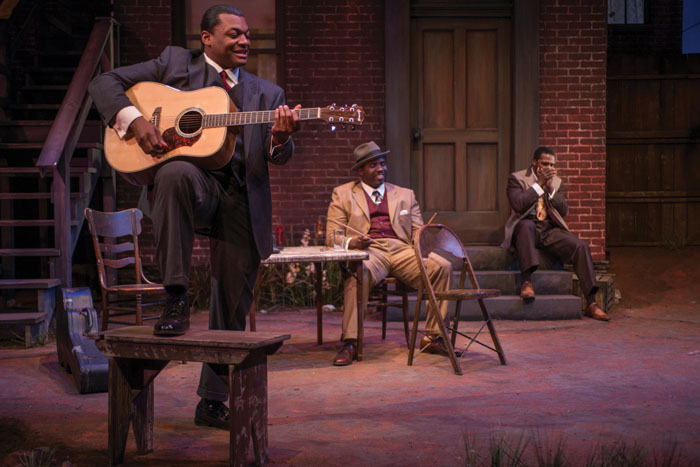
August Wilson’s “Seven Guitars,” now playing at Court Theatre, takes place during a crucial moment for the blues. The year is 1948, and Big Bill Broonzy and Tampa Red have been holding down the Chicago blues scene since the 1920s. Alan Lomax first recorded Muddy Waters in Stovall, Mississippi just seven years before. Waters’s hit “I Can’t Be Satisfied” has just been released. As Muddy Waters’s ascent to mythic status begins, to the east another blues guitarist passes from this world.
In Pittsburgh, a backwater in the development of the blues, Floyd “Schoolboy” Barton (played at Court by Kelvin Roston, Jr.) was by all appearances on the eve of success. He was about to have something, for the first time in his life. He and his band—Canewell the harmonica player (Jerod Haynes) and Red the drummer (Ronald Conner)—have had one hit song from a single recording session in Chicago. Then, suddenly, Floyd dies. His friends gather in the Hill District backyard of the group’s unofficial matriarch, Louise, played by the lively and engaging Tony-nominated Felicia Fields.
The play, told mostly through flashback, is ostensibly about Floyd as he struggles to win back his woman, Vera (Ebony Wimbs), and makes plans to return to Chicago to become a real star. It is a story that spans the intimate details of these people’s lives, equal parts tragedy and playful comedy. However, for a play about the blues, “Seven Guitars” has little on-stage blues music. Early in the play, Floyd pulls out his guitar and idly strums it, and the auditorium shivers in anticipation. But he puts it back in its case and heads to the pawnshop. Floyd’s one hit record, “That’s Alright,” can be heard on the record player periodically throughout the play, as well as on the characters’ lips. But only once do he and his band perform on stage. They play an impromptu version of “Hoochie Coochie Man”—an insertion by Director Ron OJ Parson—written by Willie Dixon and originally recorded by Muddy Waters. It is a rendition so full of contagious spirit that it becomes impossible to doubt that this man was a blues star on the rise.
Still, “Seven Guitars” is not lacking in the blues. The dialogue is lyrical and flows and stops and starts with the rhythm of Delta Blues in one scene, Piedmont Blues in another. The outline of the plot seems pulled straight from a blues song—he lost his woman, and now he’s longing to go to the center of the world, Chicago. But there is something more complex and intriguing happening in this Pittsburgh backyard. The blues is not the only music with a stage presence. Hedley (Allen Gilmore), who raises and processes chickens in his backyard, brings an older form with him. Gilmore’s strong, weary, mournful voice seems made for the wistful call and response that weaves in and out, throughout the show. It is a refrain that simultaneously hearkens back in tone to the oppressive horror of the Middle Passage while expressing a stubborn faith that he will be a “big man” some day, even in a white man’s country.
From the beginning, Floyd’s big personality dominates the stage, even in death. The first scene shows the six people he was closest to gathered in Louise’s backyard, a heavy mood hanging over the dusty yard as they sit and reflect after Floyd’s funeral. Most of the action takes place in the past, soon after Floyd’s return from cutting his first record in Chicago. His song has just been released and become a hit. All eyes, whether adoring or jealous, are on him for the first half of the play. But then, Hedley’s character gradually expands from comic relief into a deeply complex and tragic figure who contends with Floyd for the spotlight. Much of the play, especially following the intermission, exhibits the form of a struggle between the new, fast, loud and exciting world personified by Floyd and Chicago electrified blues, and an older, prouder world—one with Toussaint L’Ouverture’s slave revolt in Haiti still vividly present in ancestral memory. This struggle is shown symbolically when, as Floyd, Canewell, and Red start their Muddy Waters jam session, Hedley builds a one-string diddley bow, an instrument with its roots in traditional West African music. This tension is all the more unsettling because of the sense, articulated by Parson in a post-show discussion, that Floyd’s urban, post–WWII musical aspirations and Hedley’s diddley bow can all be ultimately traced back to the common cradle of Africa.
“Seven Guitars” earned August Wilson the 1996 New York Drama Critics’ Circle Award for Best Play. Under the direction of Ron OJ Parson, Court Theatre’s artist-in-residence, the three-hour play becomes an exquisitely raw and powerful experience. It is a story broad in scope, with intricately intertwining plot lines, and yet it maintains a clarity and coherence that is dazzling. Take a lesson from Louise—when the music stops, just keep singing the blues.
Court Theatre, 5525 S. Ellis Ave. Through February 9. See website for show times and prices. (773)753-4472. courttheatre.org
